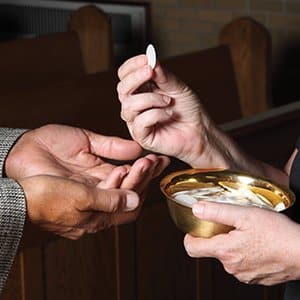
Lent with the Saints: Teresa of Avila
Teresa brought her prodigious gifts to her time. She grounded her public persona in a deep personal life.
Find what you’re looking for

Teresa brought her prodigious gifts to her time. She grounded her public persona in a deep personal life.

Stability brings the point of departure and the place of arrival together in a dynamic stillness and a radical openness to change.

Wisdom 2:1a, 12–22; Psalm 34:17–18, 19–20, 21, 23; John 7:1–2, 10, 25–30
“You know me, and you know where I am from. I have not come on my own. But the one who sent me is true, and you do not know him. I know him, because I am from him, and he sent me” (John 7:28–29). These words are from today’s Gospel of John, as Jesus, threatened by his enemies, nevertheless comes to the Temple in Jerusalem for the Feast of Tabernacles. He begins to teach openly about who he is. His words challenge those who would claim intimacy with God but are in fact far from it.

In the Gospel of John, “the disciple whom Jesus loved ” is at the foot of the cross (19:26) and is entrusted with caring for the mother of Jesus (19:27). Who is this disciple and what makes him more loved than anyone else?
For centuries, most Christians have thought it was the Apostle John, but biblical scholars have more recently questioned this. The “Beloved Disciple, ” who appears only in the Gospel of John, is introduced in 13:23 with later references in 18:15–16; 19:26–27; 20:2–4, 8; and 21:7, 20, 23–24.

We cannot rewrite history—though it is our duty to learn from it.

This month, parishes across the country will light their paschal candles before the Easter Vigil on Holy Saturday. Chances are, some of them were made by this self-taught candlemaker.

What governs whether we stand or kneel when receiving holy Communion?
The biggest factor should be safety. While distributing Communion, I have seen a person who kneels abruptly almost trip the unsuspecting next person in line. Kneeling is not necessarily more reverent than standing. Safety should be our default in such situations.

Is it wrong to divorce a husband who commits adultery? My husband and I were married in the Catholic Church almost 30 years ago. Several years ago he committed adultery, and the pain still remains with me. I have tried to forgive him but long for something much more important: healing.
No, a civil divorce is an option. Depending on evidence provided, a canonical “declaration of nullity ” may also be possible.

We slice up experience into beginnings, middles and ends and draw lessons from the slices.

Exodus 32:7–14; Psalm 106:19–20, 21–22, 23; John 5:31–47
Before he became the “go-to” saint for finding lost objects, St. Anthony of Padua had another nickname: “The Hammer of Heretics.”

28 W. Liberty Street
Cincinnati, OH 45202
513-241-5615
info@franciscanmedia.org
Customer Service:
cservice@franciscanmedia.org
Technical Questions:
support@franciscanmedia.org
Writer’s Guidelines
Privacy Policy
Post a Prayer Request
Webmaster Login